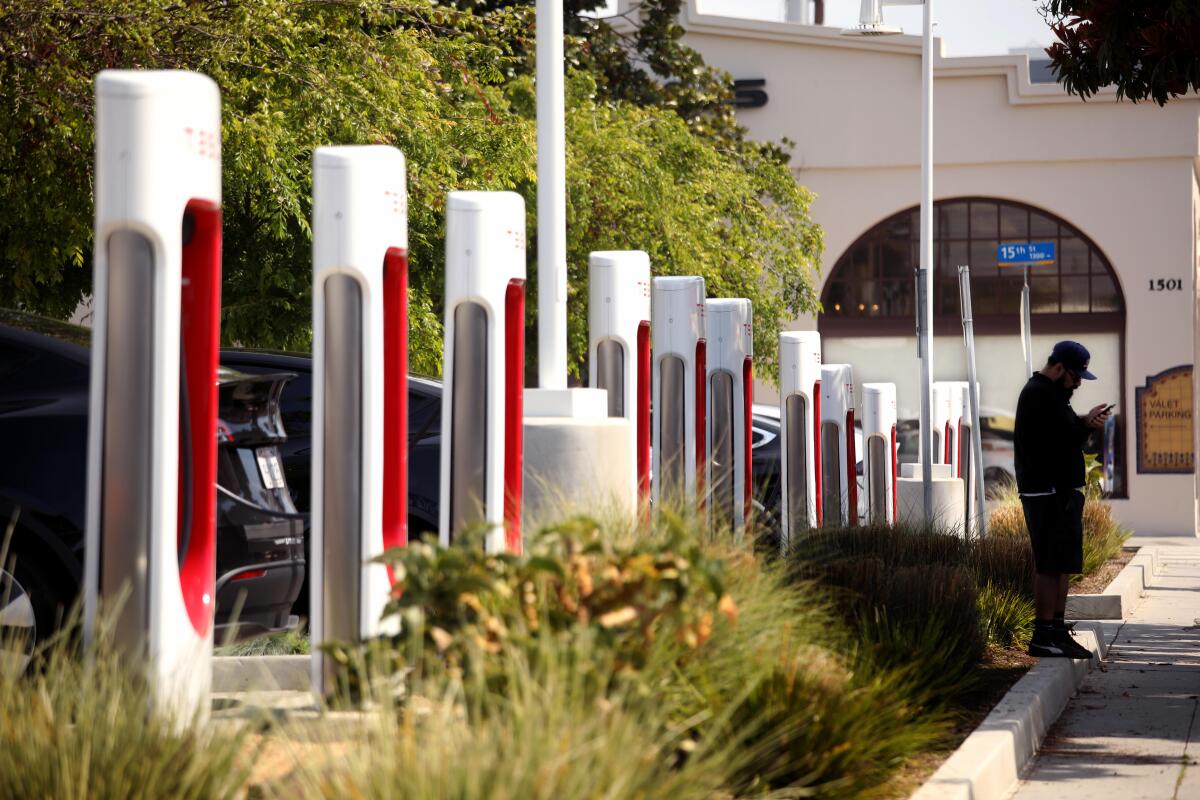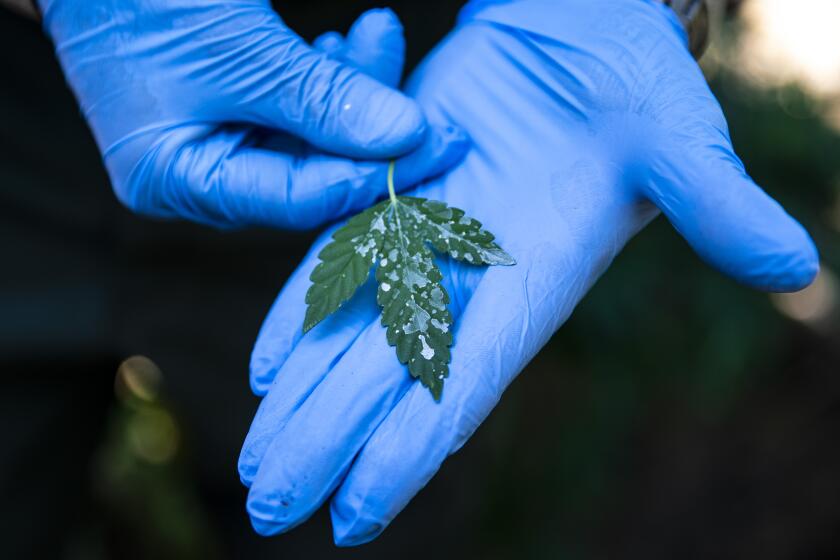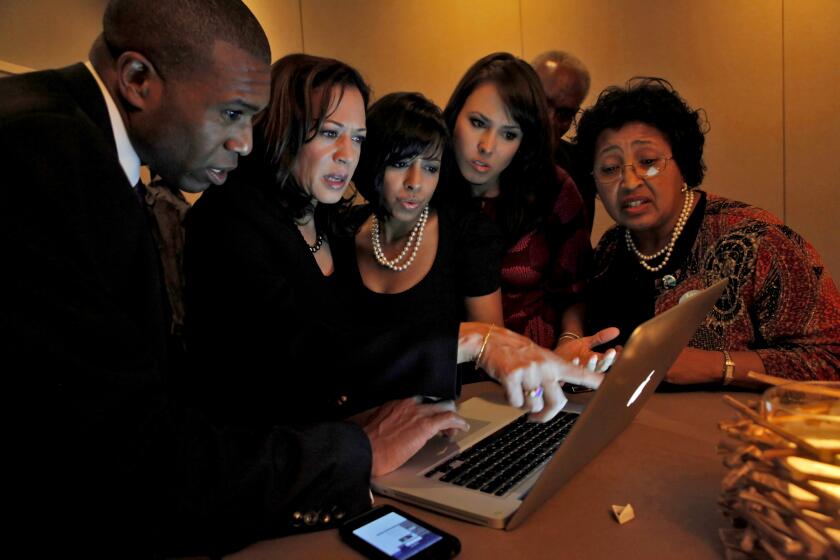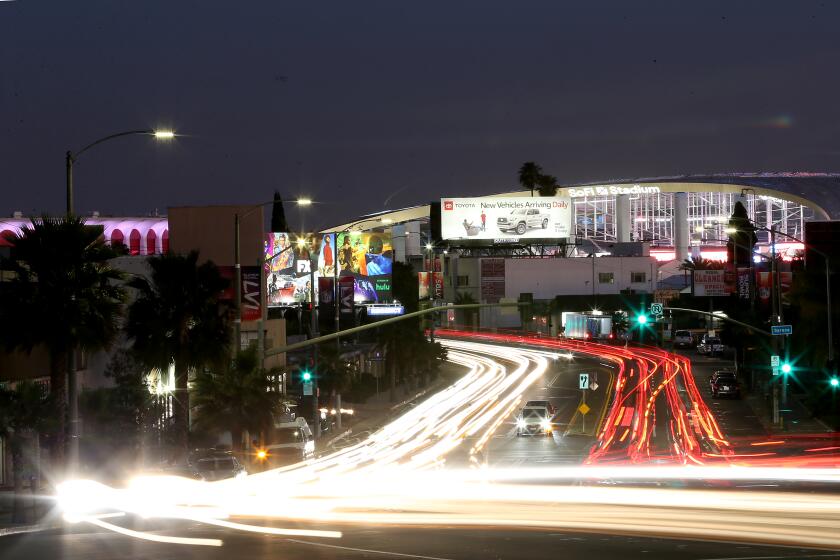Newsletter: Dislike Tesla? OK, but here’s why you should love its Superchargers

Good morning. I’m Mariel Garza, and it is Wednesday, May 15. Let’s look at what’s going on in Opinion.
Last year I wrote that I was considering trading in my fully electric 2019 Kia Niro for a plug-in hybrid. Not because of range anxiety, so much as charger anxiety. The real headache of going electric is finding an available, functional public charger when traveling.
“When I chose an electrical vehicle, I knew that meant an extra 30 minutes in travel time for each charging stop during a road trip,” I wrote at the time. “But I did not count on the time wasted by having to, for example, backtrack to another station or one out of my way because the charging station on my route was not working. I did not count on having to wait 60 minutes to charge because the fast charger is not charging very fast today. Or having to spend the wait time baking in the sun because the charging station on the side of a hot freeway has no shade.”
I heard from dozens of people who recounted their own frustrating public charging experiences or pleaded with me not to give up on EVs just yet. I also received quite a few smug-o-grams from Tesla owners bragging about the awesomeness of the Supercharger network. It may be hard for some to believe, but not everyone wants a Tesla.
I didn’t end up dumping the Niro, but mostly because car shopping is such a time suck — and because I haven’t done much road tripping and forgot how frustrating it was. But last week I drove up to the Carrizo Plain National Monument (no superbloom, but still worth visiting), and let me tell you, the public charging situation for us unfortunate non-Tesla owners has not improved.
I needed to “fill up” before heading into the remote grasslands between Highway 101 and Interstate 5 where there are no businesses, let alone electric chargers. But there were only two fast charging stations on my route at the south end of the Central Valley, and they were wholly insufficient for the demand. The first station had just three chargers; the second had four. All were functioning that Monday morning, which was a happy surprise, but they were all in use — with cars lined up waiting. (Something that I have witnessed with distressing regularity at public chargers over the past year.) Even worse, both locations were within view of significantly larger Tesla charging stations taunting me with rows of mostly empty chargers — 24 in one spot, 20 in another.
This sight was frustrating — but also kinda hopeful? This time next year, those empty charging stations will be open to me and any other non-Tesla driver with a port adapter, and some of the superchargers will be “magic docks” with built-in adapters. And starting this year, most new EVs will come equipped with Tesla charging ports — or rather what is now called the North America Charging Standard port.
That’s right: Tesla won the charger war. Someone had to. EVs couldn’t keep using an array of plugs. Imagine if gas-powered cars all required different spouts to fill up the tank?
Is this going to solve the charging crisis and encourage faster EV adoption? I don’t know. Tesla Chief Executive Elon Musk laid off the entire Supercharger group earlier this month and then started hiring them back shortly thereafter, which doesn’t inspire a lot of confidence in the network’s future. But I am willing to hold on for another year to find out.
Michael Cohen started testifying against Trump. Here’s what prosecutors need from him. “This week’s testimony will determine whether his word is strong enough to support a measure of accountability for his former boss,” writes legal affairs columnist Harry Litman.
SoCal air quality officials haven’t acted to cut port pollution. They escaped to a desert resort instead. The editorial board points out that for yet another year in a row, the “South Coast Air Quality Management District’s governing board has chosen to delay and waste time in fruitless talks rather than impose regulations to curb diesel emissions from cargo-moving trucks, ships, trains and equipment at the Los Angeles-Long Beach ports.” Boo.
Enjoying this newsletter? Consider subscribing to the Los Angeles Times
Your support helps us deliver the news that matters most. Become a subscriber.
The real reason why Oregon recriminalizing drugs is a cautionary tale. Specifically for California, which is dealing with its own backlash to criminal justice reform laws. Researchers Morgan Godvin and Joseph Friedman argue in an op-ed that the problem is rising fentanyl use, and data shows that criminal penalties don’t avert drug use. “If police massively scale up arrests of people who use drugs, increased overdose deaths will be the predictable result.”
The NCAA’s dilemma about trans athletes shouldn’t be that hard of a call. Why do college sports exist anyway? That question should guide the NCAA to create policies that colleges and athletes can live with, not politics, writes columnist LZ Granderson.
More from this week in opinion
From our columnists
- Robin Abcarian: Stormy Daniels earns a well-deserved place in American history
- Jackie Calmes: Our elections have integrity. These politicians do not
From the Editorial Board
- House antisemitism bill would stymie free speech and wouldn’t make students safer
- Biden’s plan to reschedule marijuana may finally end ‘Reefer Madness’
From the Op-Ed desk
- Californians love the state’s parks. We just don’t know they’re state parks.
- How L.A.’s Chinatown helped reinvent Southern California
- Biden still trails Trump in the polls. His problem goes beyond inflation, Gaza and age
Letters to the Editor
- Liberals don’t need to get a gun because everyone else has one
- A Latino moderator, mic cutoffs, no audiences: Reader ideas for Biden-Trump debates
- Sam Rubin was my kid’s soccer coach. He treated all of us like celebrities
Stay in touch.
If you’ve made it this far, you’re the kind of reader who’d benefit from subscribing to our other newsletters and to The Times.
As always, you can share your feedback by emailing me at paul.thornton@latimes.com.
A cure for the common opinion
Get thought-provoking perspectives with our weekly newsletter.
You may occasionally receive promotional content from the Los Angeles Times.




